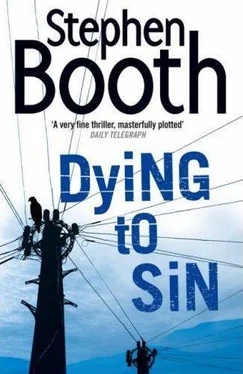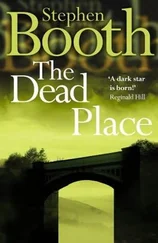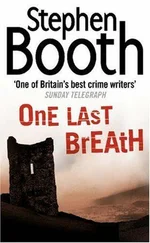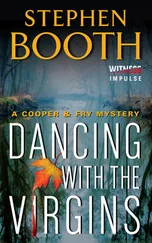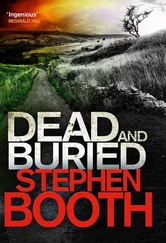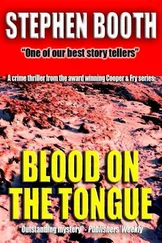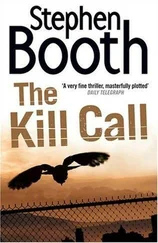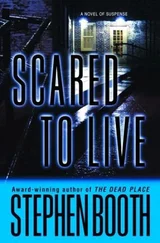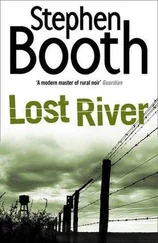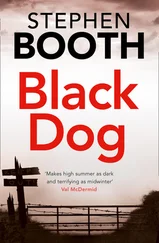Stephen Booth - Dying to Sin
Здесь есть возможность читать онлайн «Stephen Booth - Dying to Sin» — ознакомительный отрывок электронной книги совершенно бесплатно, а после прочтения отрывка купить полную версию. В некоторых случаях можно слушать аудио, скачать через торрент в формате fb2 и присутствует краткое содержание. Жанр: Полицейский детектив, на английском языке. Описание произведения, (предисловие) а так же отзывы посетителей доступны на портале библиотеки ЛибКат.
- Название:Dying to Sin
- Автор:
- Жанр:
- Год:неизвестен
- ISBN:нет данных
- Рейтинг книги:3 / 5. Голосов: 1
-
Избранное:Добавить в избранное
- Отзывы:
-
Ваша оценка:
- 60
- 1
- 2
- 3
- 4
- 5
Dying to Sin: краткое содержание, описание и аннотация
Предлагаем к чтению аннотацию, описание, краткое содержание или предисловие (зависит от того, что написал сам автор книги «Dying to Sin»). Если вы не нашли необходимую информацию о книге — напишите в комментариях, мы постараемся отыскать её.
Dying to Sin — читать онлайн ознакомительный отрывок
Ниже представлен текст книги, разбитый по страницам. Система сохранения места последней прочитанной страницы, позволяет с удобством читать онлайн бесплатно книгу «Dying to Sin», без необходимости каждый раз заново искать на чём Вы остановились. Поставьте закладку, и сможете в любой момент перейти на страницу, на которой закончили чтение.
Интервал:
Закладка:
Some retired coppers chose to run pubs. They wanted to stay busy, they said, so they kept themselves close to the public — and sometimes a bit too close to the alcohol, as well. But ex-Police Constable David Palfreyman had hit his thirty and retired to his garden. He had a decent-sized patch behind Hollowbrook Cottage. It was a well-kept property that had been carefully modernized, and lots of money had been pumped into its appearance. Palfreyman’s cottage would be worth a packet by the time he had to sell it to pay for his medical and social care in old age.
Right now, though, Palfreyman looked robustly healthy. He was a big man, a couple of inches over six feet and keeping his muscles from sagging too much by regular physical activity. Like other balding men who spent a lot of time outdoors, he had to wear a hat to avoid the damage the weather could do to his head, summer or winter. The former constable had chosen a dilapidated fedora that flopped low at the brim, shielding his eyes from the rain.
He met Cooper at the gate, having seen him coming up the length of his drive. He seemed genuinely pleased to see Cooper’s warrant card, which was a rare event. And, for the first time that day, Cooper was invited in.
On the doorstep, Palfreyman paused and pointed out a passing car. ‘That’s Mary Greenhalgh, on her way to pick up the kids from school. If you watch, there’ll be a blue Vauxhall go by in a couple of minutes. That will be her boyfriend.’
‘Boyfriend?’
‘Lover, if you like. He visits Mary in the afternoons, then they leave the house separately — she goes off to fetch the kids, and he drives off in the other direction, turns round and comes back. I think he lives near Buxton.’
Just as Palfreyman had predicted, a blue Vauxhall went by, driven by a man with fair hair who was straightening his tie with one hand.
‘Do you know everything that goes on around here?’
‘It’s second nature to notice things, after thirty years in the job. Besides, I don’t have much else to do with my time. There’s precious little gardening in the winter.’
When Palfreyman gestured, Cooper saw that blue veins snaked across the back of his hands. But they were large hands, with the sort of palms that might have delivered a smart slap to a recalcitrant youth in the old days.
Palfreyman put the kettle on, and immediately began to talk. He revealed that he’d spent his entire career in what would now be known as ‘core policing’. Beat bobbying, he called it. Never a specialist of any kind, and never a candidate for promotion. He’d made it to his thirty without a black mark on his record, and without any commendations either. A man with no ambitions beyond doing his job and staying out of trouble.
Cooper thought he knew the type. No doubt Palfreyman had spent the last few years of his service counting down the weeks and days as his retirement got closer, as so many officers did. In police stations all over the country, officers had the date they would qualify for their full pension circled in red on a calendar.
‘Have a seat,’ said Palfreyman. ‘I won’t be long.’
Cooper settled himself in the lounge, admiring a jade-green rug and an IKEA coffee table while he watched the retired bobby fussing about in the kitchen.
From what Palfreyman said, he’d been committed to the job in his own way. Lots of younger officers would have considered a posting to a rural backwater as a punishment. Not too much crime to deal with out here, was there? It was more of a PR job than proper policing, really — the visible face of the old-fashioned British bobby, providing reassurance for the public.
Palfreyman was grey-haired, but still a big man. A lot of the weight he carried must have been put on since he finished active service. He thumped around the kitchen on feet that seemed to be wearing a permanent pair of heavy boots, even after he’d taken them off in the porch.
Actually, he wouldn’t have lasted much longer in the force, if he hadn’t been due for retirement. Cooper couldn’t see him as a modern response officer, turning up on blues and twos for a punch-up outside a pub or to chase a burglary suspect over a few garden walls. His supervisors would have put him behind a desk, where he could fill in forms. And he’d have hated it. Cooper could picture him in the corner of an office, oozing resentment and cynicism.
‘So you’ve still got your finger on the pulse of Rakedale, Mr Palfreyman?’
‘Not exactly. Not like I used to. But I know when its blood pressure is up, if you follow me.’
‘But you’re familiar with the history of Pity Wood Farm?’
‘You ought to talk to Tom Farnham,’ said Palfreyman. ‘He worked at Pity Wood. He was the only one who worked there any length of time, I think. But then, he’s local. All the rest of them stayed for a few months, then moved on.’
‘The rest?’
‘Casuals. Short-term labour.’
‘Are you referring to itinerant workers?’
‘Oh, aye. Lots of them have turned up at Pity Wood over the years. Coming and going all the time, they were. It made it difficult to keep track, from my point of view. I never quite knew who was living in the area at any one time. Well, I tried to persuade Raymond to keep better records, but it was a waste of breath. It’s amazing to me that they didn’t get into trouble. They wouldn’t get away with it now, the regulations are too tight. So much bureaucracy. But then, you must know that, in the job.’
‘Did you find the Sutton brothers difficult to deal with, Mr Palfreyman?’
‘Difficult?’ He sniffed thoughtfully. ‘Well, they were a funny bunch, the Suttons. I was round there once, in the days before Tom Farnham appeared on the scene. Derek and Raymond were just sitting in that room there, one either side of the table, not speaking a word to each other. Weird, it was. Like they were afraid of breaking the silence, as if they thought something terrible would happen if they were the first to speak.’
‘Was there bad blood between them? Did the brothers have an argument of some kind?’
‘Not that I know of. Not in living memory, anyway. I think that’s just the way they were. Awkward, pig-headed buggers. You know the type.’
‘Yes, I think I do.’
Another car passed on the road outside, and Palfreyman turned his attention away.
‘I see you have a cat,’ said Cooper on the way out, noticing an elegant ball of fur curled on a rug in the kitchen.
‘Yes. He’s a Burmese.’
‘Did the Suttons have a lot of cats?’
‘God knows,’ said Palfreyman. ‘Well, probably. All farms have cats, don’t they?’
Fry and Murfin were invited in, too. But the property they’d arrived at wasn’t a farm, not any more. Someone had bought the farmhouse and converted it into a nice family home, but had let the land go to neighbouring farmers. If there had been outbuildings on the property, there was no sign of them now. This was pretty much what Pity Wood was intended to be, Fry thought.
A nice new Range Rover stood on the drive, the only car she’d seen for a while that wasn’t plastered with mud. Inside, the home was immaculate — probably kept in that condition by the small, Asian-looking woman that Fry had glimpsed passing like a ghost from the kitchen into the passage when she arrived.
‘We don’t see much of the village people,’ said Mrs Brindley, setting out a tray with a welcome cup of tea for her visitors. ‘Not that we aren’t village people ourselves, but you know what I mean.’
‘Not really,’ said Fry.
‘Well, Rakedale … there’s no reason to go there, not as far as we’re concerned. Yes, even though it’s only half a mile away. It’s not as if it has any shops, or a post office. Or a church.’
Читать дальшеИнтервал:
Закладка:
Похожие книги на «Dying to Sin»
Представляем Вашему вниманию похожие книги на «Dying to Sin» списком для выбора. Мы отобрали схожую по названию и смыслу литературу в надежде предоставить читателям больше вариантов отыскать новые, интересные, ещё непрочитанные произведения.
Обсуждение, отзывы о книге «Dying to Sin» и просто собственные мнения читателей. Оставьте ваши комментарии, напишите, что Вы думаете о произведении, его смысле или главных героях. Укажите что конкретно понравилось, а что нет, и почему Вы так считаете.
